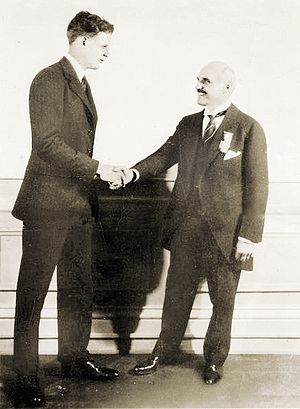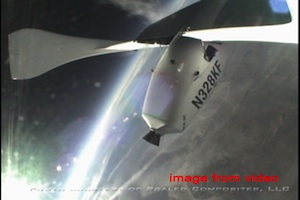
- Image via Wikipedia
After the recent oil spill disaster in the Gulf of Mexico, many ideas have been pouring in from chemical engineers on how to stop the spill and clean it up. This leads to the question -- should innovative ideas be solicited from the public and for the top solution to be rewarded with a prize? Will competition drive innovation and solve some of the greatest technical challenges facing the world today?
In 1775, Nicolas LeBlanc discovered how to manufacture soda ash from common salt in response to a prize offered by the French Academy of Sciences. The two step process became the basis of the modern chemical industry and is considered a key chemical engineering invention.
Today's $250 billion aviation industry is the result of the $25,000 Orteig Prize won by Charles Lindbergh for the first non-stop flight between New York and Paris. Hundreds of aviation prizes stimulated the advancement of aircraft technology between 1905 and 1935. Nine teams attempted to cross the Atlantic and collectively spent $400,000 to win the $25,000 prize.
In 1996, the first X PRIZE competition was announced, which was intended to encourage research and development in space exploration technology. Inspired by the Orteig Prize, the $10 million prize would be awarded to the first team to build and launch a spacecraft capable of carrying three people to 100 km above the earth's surface, twice within two weeks. The Ansari X Prize, the largest prize in history, had 26 teams from 7 different nations compete. The teams spent more than $100 million combined. On October 4, 2004, the Ansari X Prize was won by Mojave Aerospace Ventures with their spacecraft SpaceShipOne. Recently, private space travel companies SpaceX and Virgin Galactic have made rapid advances and Virgin Galactic is already selling seats for the first commercial space flights, estimated to start within two years.

In 2009, McKinsey and Company released the report, "'And the winner is...' Capturing the Promise of Philanthropic Prizes" in which they concluded that "incentive prizes are a unique and powerful tool that should be in the basic toolkit of many of today's philanthropists. Their recent renaissance is largely due to a new appreciation for the multiple ways in which they can produce change: not only by identifying new levels of excellence and by encouraging specific innovations, but also by changing wider perceptions, improving the performance of communities of problem-solvers, building the skills of individuals, and mobilizing new talent or capital."
The report also states,
Prizes attract diverse groups of experts, practitioners, and laypeople -- regardless of formal credentials -- to attempt to solve difficult problems, dramatically expanding the pool of potential solvers and lower the cost of attempting or recognizing solutions...A core power of prizes derives from their openness: their ability to attract diverse talent, generate unexpected approaches, and reveal unusual perspectives in the face of a problem or challenge."
AIChE and the Rocky Mountain Institute recently held the 10xE competition to enable the radical efficiency gains needed to unleash the next wave of engineering innovation. The top submissions were recognized at the AIChE Spring Meeting in San Antonio and RMI is considering including the the entries for the 10xE casebook it is preparing to spread the lessons learned as design best practices. The July issue of CEP Magazine features the winner and three honorable mention entries. The article is available for free to AIChE members and as a download on ChemE on Demand.
The X Prize Foundation plans to launch 10 new prizes over the next five years with a combined value of approximately $100 million. The current X Prize competitions include:
- Archon X PRIZE for Genomics ($10 million) awarded to the first team that can build a device and use it to sequence 100 human genomes within 10 days or less at a demonstrated cost <$10,000 per genome
- Google Lunar X PRIZE ($30 million) for the first privately funded team to send a robot to the moon, travel 500 m, and transmit video, images, and data back to the Earth
- Progressive Automotive X PRIZE ($10 million) to be awarded in Sept. 2010 to the teams that win a rigorous stage competition for clean, production-capable vehicles that exceed 100 MPG energy equivalent (MPGe)
The X Prize Foundation is also responding to the current oil spill disaster by considering a multi-million dollar competition to help alleviate the effects of the BP oil spill in the Gulf of Mexico. If developed, the prize could incentivize the development of rapidly-deployable methods for the clean-up of crude oil along our coastlines and within our oceans. It is not currently guaranteed and further details on the development of the competition will be announced as they are available.
Chemical engineers' unique skills and talents provide a strong foundation to develop solutions for effectively dealing with the oil spill. We stand in a strong position to potentially win such a competition should it be developed. More importantly, we have the satisfaction that we contributed to correcting the man-made disaster and possibly averting another one in the future.
What types of competitions and prizes would you like to see developed?
What do you believe is the future of innovation?
What do you think a BP oil spill X Prize should develop?
See a video of SpaceShip One in the Ansari XPrize Competition.
image: SpaceShipOne Wins the X Prize
Related articles by Zemanta
- Want $10 Million? X Prize Foundation Announces Prize for Gulf Oil Spill Solution (triplepundit.com)
- X PRIZE Foundation Aims to Launch $100M in Prizes Over Next 10 Years, Targeting 4 Key Areas (greencarcongress.com)
- Got a fix for oil spill? It may be worth a prize (sfgate.com)
- Got a fix for oil spill? It may be worth a prize (seattletimes.nwsource.com)



Comments
Money and Fame are fabulous motivators. Inherently, humans like to have a reason for doing things - you go to school for the promise of a better future, you go to work for the paycheck and you buy the fancy car because of how cool you look in it and to see the faces of everyone else gawking at you as you breeze by. People do research to make advancements, find cures and publish papers. Prizes, as pointed out, would draw some people that wouldn't normally dedicate their free time to such a cause in addition to the career researchers. Prizes also draw attention to an issue (it must be important if they are offering several million dollars for it!). Attention spurs awareness and awareness can change personal decisions and societal norms (i.e. green initiatives). Prizes for scientific advancements may help stimulate further discoveries (as is suggested by the aero examples).
A possible downside though… If cash rewards become too plentiful, will we lose the random acts of invention? There is always the appeal of patenting and capitalizing on an invention, but will people focus too much on the items that have a large and certain payout associated with it? Will people begin to expect massive monetary compensation for innovation?
People can be classified into two groups on the basis of why they work: 1.Those who take part in any work only for money. 2.People who are keen to explore their concerned area of work with interest and passion and not for commercial aspects. Perhaps, people of second type, as mentioned above, enjoy their work to the fullest. As they enjoy their work and since they are passionate and love what they do, the output of their work would certainly be very fruitful.The people belonging to first kind can't enjoy their work to a maxim and probably do some hard-work. And this gives us a clear idea about work and hard-work.
Yes, however, someone could work really hard and still not have any success... Work or hard-work don't necessarily predict the actually outcome or result of the work.